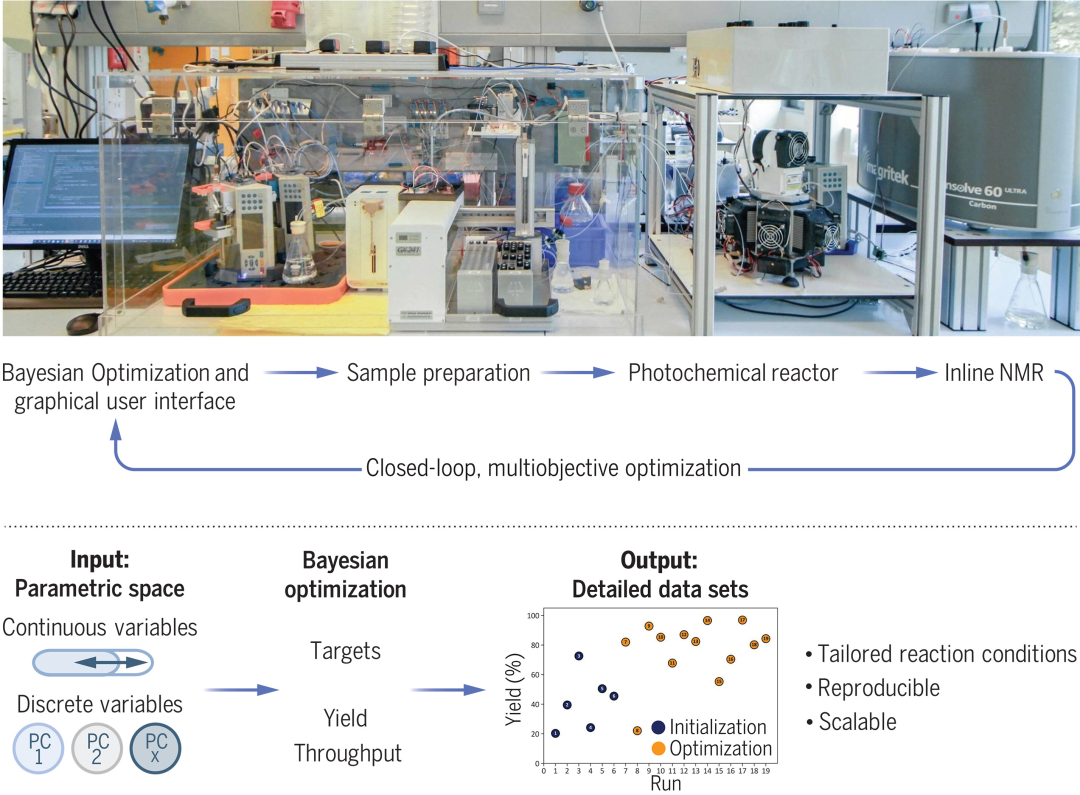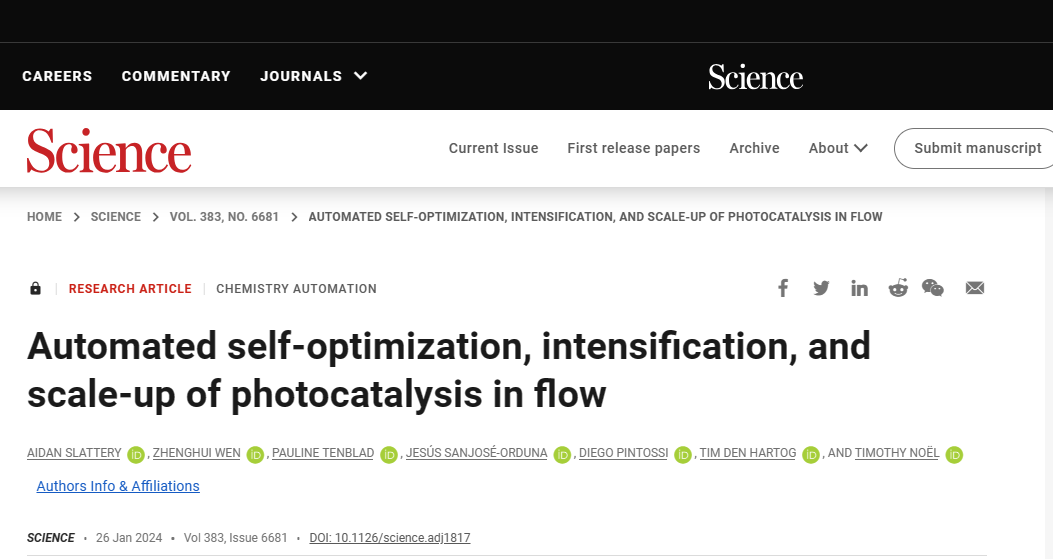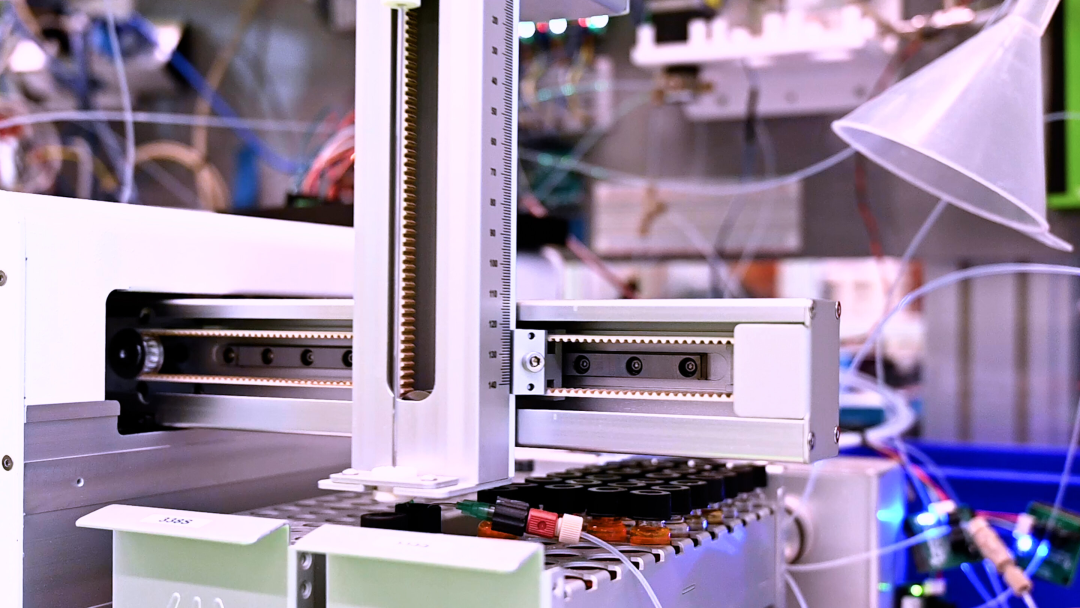Home >Technology peripherals >AI >AI autonomous chemical synthesis robot: Refreshing the speed of chemical discovery and surpassing human chemists in accuracy and innovation
AI autonomous chemical synthesis robot: Refreshing the speed of chemical discovery and surpassing human chemists in accuracy and innovation
- PHPzforward
- 2024-01-31 13:39:05874browse
Editor | However, most current research focuses on small-scale reactions, while scaling up requires the integration of different techniques and may require a lot of trial and error for optimization.
In response to the need for efficient optimization of complex photocatalytic reaction conditions, the team of Professor Timothy Noël from the Van 't Hoff Institute of Molecular Science at the University of Amsterdam (
UvA) developed An autonomous chemical synthesis robot integrated with an artificial intelligence-driven machine learning unit was developed. Called "RoboChem," this desktop device outperforms human chemists in speed and accuracy, while delivering a high level of ingenuity.
 #RoboChem: A benchtop robotic platform for self-optimization, intensification and amplification of photocatalytic conversion. (Source: Paper)
#RoboChem: A benchtop robotic platform for self-optimization, intensification and amplification of photocatalytic conversion. (Source: Paper)
The system is a robot that works autonomously around the clock, delivering results quickly and tirelessly. Noël says that in a week, the robot can optimize the synthesis of about ten to twenty molecules, which would normally take a PhD student several months. In addition to providing optimal reaction conditions, the robot also offers settings for scale-up, allowing us to produce quantities directly relevant to pharmaceutical industry suppliers.
The related research was titled "Automated self-optimization, intensification, and scale-up of photocatalysis in flow" and was published in "Science" on January 26, 2024.
 Paper link: https://www.science.org/doi/10.1126/science.adj1817
Paper link: https://www.science.org/doi/10.1126/science.adj1817
Noël’s team’s expertise is “flow chemistry”, a technology for chemical reactions in continuously flowing fluids. Small and flexible pipe systems replace beakers, flasks and other traditional chemical tools.
In RoboChem, robotic needles carefully collect starting materials and mix them in small volumes of just over half a milliliter. They then flow through the piping system to the reactor. There, light from powerful LEDs triggers molecular transformations by activating photocatalysts in the reaction mixture.
The process then continues to an automated NMR spectrometer to identify the converted molecules. This data is fed back in real time to the computer controlling the RoboChem.
“This is the brains behind RoboChem,” Noël said. "It uses artificial intelligence to process information. We use machine learning algorithms to autonomously determine which reactions to perform. It always aims for the best results and continuously improves its understanding of chemistry."
 The robotic needle sampler selects precise amounts of various reagents and skillfully mixes them to create reaction solutions. (Source: UvA)
The robotic needle sampler selects precise amounts of various reagents and skillfully mixes them to create reaction solutions. (Source: UvA)
The group put a lot of effort into substantiating RoboChem’s results. All molecules included in the paper were manually isolated and examined. Noël said he was impressed by the system's ingenuity.
"I have been working on photocatalysis for more than ten years. Still, RoboChem shows results that I couldn't predict. For example, it discovered reactions that require very little light. Sometimes I have to scratch my head. , trying to figure out what exactly it does. And then you wonder: Would we do the same? Looking back, you can see the logic of RoboChem. But I doubt we would get the same results ourselves. Or at least not so fast".
The researchers also used RoboChem to replicate previously published research in four randomly selected papers. They then determined whether Robochem produced the same or better results.
"In about 80 percent of the cases, the system produced better yields. For the other 20 percent, the results were similar," Noël said. "This leaves me with no doubt that AI-assisted methods will benefit chemical discovery in the broadest sense."
Искусственный интеллект совершает прорыв в химии
Актуальность RoboChem и другой «компьютеризированной» химии также заключается в генерации высококачественных данных, Ноэль сказал, что это принесет пользу будущему использованию искусственного интеллекта.
«При традиционных химических открытиях тщательно изучаются только несколько молекул. Затем результаты экстраполируются на, казалось бы, похожие молекулы. RoboChem генерирует полный и всеобъемлющий набор данных, в котором каждая молекула получает все необходимые параметры. Это обеспечивает больше информации.»
Другая особенность заключается в том, что система также записывает «отрицательные» данные. В современной научной практике большинство публикуемых данных отражают лишь успешные эксперименты. «Неудачные эксперименты также предоставляют соответствующие данные», — сказал Ноэль.
"Но это можно найти только в рукописных лабораторных заметках исследователей. Эти записи еще не опубликованы и поэтому не могут быть использованы для химии, управляемой искусственным интеллектом. RoboChem тоже изменит это. Я не сомневаюсь, что если вы хотите использовать искусственный интеллект для достижения прорыва в химии, вам понадобятся роботы такого типа».
Справочный контент: https://phys.org/news/2024-01-autonomous- синтез-робот-ai -chemical.html
The above is the detailed content of AI autonomous chemical synthesis robot: Refreshing the speed of chemical discovery and surpassing human chemists in accuracy and innovation. For more information, please follow other related articles on the PHP Chinese website!

